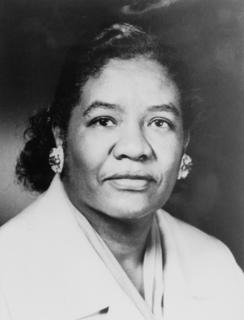Dorothy Lavinia Brown facts for kids
Quick facts for kids
Dorothy Lavinia Brown
|
|
|---|---|
 |
|
| Born | January 7, 1914 Philadelphia, Pennsylvania, U.S.
|
| Died | June 13, 2004 (aged 90) Nashville, Tennessee, U.S.
|
| Occupation |
|
| Known for | first female African American in the Tennessee General Assembly |
Dorothy Lavinia Brown (born January 7, 1914 – died June 13, 2004), also known as "Dr. D.", was an amazing African-American doctor who performed surgery. She was also a lawmaker and a teacher.
Dr. Brown made history in many ways. She was the first African-American woman surgeon from the Southeastern United States. She was also the first African-American woman to be elected to the Tennessee General Assembly, which is like the state's parliament. While working as a lawmaker, she fought for the rights of women and people of color.
Contents
Early Life and Challenges
Dorothy Brown was born in Philadelphia, Pennsylvania. When she was just five months old, her mother, Edna Brown, placed her in an orphanage called the Troy Orphan Asylum in Troy, New York. Dorothy lived there until she was 12 years old.
Even at a young age, Dorothy was inspired to become a surgeon. She remembered the good care she received when she had her tonsils removed. She also saw a performance that made her want to do something important to make other African Americans proud.
Dorothy's mother tried to get her to live at home, but Dorothy kept running back to the orphanage. When she was 15, she ran away to attend Troy High School. The principal found out she was homeless and helped her find a new home with Lola and Samuel Wesley Redmon, who became like her foster parents. She also worked odd jobs, like helping a mother in Albany and working at a self-service laundry.
Becoming a Doctor
After high school, Dorothy went to Bennett College in Greensboro, North Carolina. This was a historically black college, which means it was founded to educate Black students. She received a scholarship to help pay for her studies. She also worked as a helper in people's homes to earn money. She earned her bachelor's degree in 1941.
In 1944, Dorothy was accepted into Meharry Medical College in Nashville, another historically black college. After finishing medical school in 1948, she did a one-year internship at Harlem Hospital in New York City.
Then, in 1949, she started her residency at Hubbard Hospital of Meharry. A residency is a long training program for doctors who want to specialize. Even though some people didn't want a woman to train as a surgeon, the chief surgeon, Dr. Matthew Walker, Sr., supported her. She finished her surgery training in 1954.
A Remarkable Career
Dr. Brown started her career by working as an inspector in the Rochester Army Ordnance Department during World War II.
From 1957 to 1983, Dr. Brown was the chief surgeon at Riverside Hospital in Nashville. In 1959, she became the first Black woman surgeon to be recognized as a Fellow of the American College of Surgeons, which is a very high honor for surgeons.
In 1966, Dr. Brown made history again. She became the first African-American woman to be elected to the Tennessee General Assembly, where she served for two years. As a politician, she helped pass the Negro History Act. This law required public schools in Tennessee to have special programs during Negro History Week to celebrate the achievements of African Americans.
After her time in politics, Dr. Brown went back to being a full-time doctor at Riverside Hospital. She also taught surgery at Meharry Medical College and advised the National Institutes of Health. She was a lifelong member of the National Association for the Advancement of Colored People (NAACP), fighting for the rights of people of color.
Personal Life and Family
In 1956, Dr. Brown decided to adopt a baby girl from one of her patients. She wanted a child and knew this was a special chance. This made her the first known single woman in Tennessee to legally adopt a child. She named her daughter Lola Denise Brown, in honor of her foster mother. Later, she also adopted a son named Kevin. Dr. Brown was a member of the United Methodist Church.
Writing and Recognitions
Dr. Brown wrote an autobiography, which is a book about her own life. She also wrote essays and inspiring guides.
She received many honors for her amazing work. In 1971, the Dorothy L. Brown Women's Residence at Meharry Medical College was named after her. She also received honorary doctorate degrees from Russell Sage College and Bennett College.
Dr. Brown was a member of the board of trustees at Bennett College and the Delta Sigma Theta sorority. She was a popular speaker at events about science, medicine, and politics, both in the U.S. and around the world. She received the Horatio Alger Award in 1994 and the Carnegie Foundation's humanitarian award in 1993.
Later Years
Dorothy Lavinia Brown passed away in Nashville, Tennessee, in 2004, at the age of 90. She died from congestive heart failure. Her life showed how one person could make a huge difference in medicine, politics, and civil rights.
See also
 In Spanish: Dorothy Lavinia Brown para niños
In Spanish: Dorothy Lavinia Brown para niños
 | Janet Taylor Pickett |
 | Synthia Saint James |
 | Howardena Pindell |
 | Faith Ringgold |

